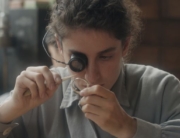Nominated by the British Academy of Film and Television Arts as the UK submission for this year’s Academy Awards, Rungano Nyoni’s I Am Not a Witch is an assured debut. Earlier this year, it received an outstanding debut award at the BATFA ceremony in a win very few saw coming, and it is logical to see why the film is held in very high esteem. Behind these covered awards rests an intimate study of oppression.
On the plains of Zambia, European tourists flock to a rural encampment to see so-called ‘’witches’’ practice their daily routines, women who are tethered by ribbons that restrict their movements. Literally cut off from the visitors by a metallic fence, the metaphor of division between north and south, black and white is clear. Meanwhile, Vivaldi’s iconic Four Seasons rings out as the tourists leave the bus. Creating a disorientating feeling, in the best possible manner, sight and sound are placed at the forefront in this dark fairy tale that is absurdist and tragic, almost in equal measure.
The narrative swiftly cuts to a small, quiet orphaned girl, nine-year-old Shula (Maggie Mulubwa), who, having nowhere else to go, follows an older woman carrying water to her home, The woman, though, becomes aggravated by the adolescent’s lingering presence outside, and she drags the girl to the local police station, claiming Shula is a witch who has spiked the village’s water. The little girl becomes isolated by a small rural community to which she has no allegiances, and the story’s basic premise comes to foreground: how human nature, regardless of location, resorts to isolate that which it does not understand.
An official of the tourism ministry, Mr. Banda (Henry B.J. Phiri), takes Shula to the aforementioned witch camp, and here the connections between the state and this small group of outsiders becomes even more peculiar when he announces the purchase of white ribbons. Shula and the women are each forced to wear an elongated ribbon tied to their backs to mark them out as ‘’other.’’ Shula is also warned that if she escapes, she’ll turn into a goat. Mr. Banda goes on to use her as a human magic trick to win favors with fellow government officials, such as her determining if a criminal suspect is telling the truth, but his most alarming act is to view Shula as a witch and not as child.
Even at 93 minutes, the stillness in the film’s second half can feel prolonged, in comparison to vitality in the initial scenes. Nevertheless, Nyoni has established herself as a refreshing new voice.







Leave A Comment